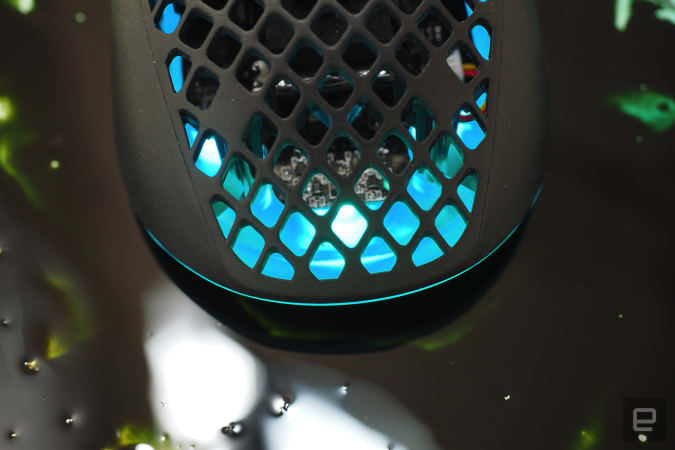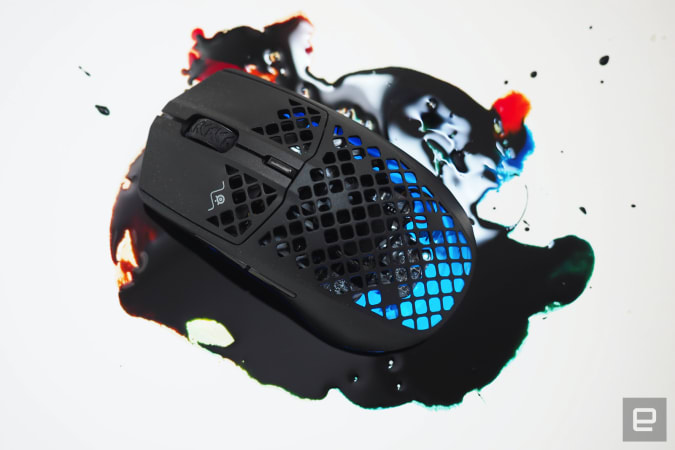
Can a gaming mouse filled with holes really be water resistant?
[ad_1]
All products recommended by Engadget are selected by our editorial team, independent of our parent company. Some of our stories include affiliate links. If you buy something through one of these links, we may earn an affiliate commission.
Like a lot of people, I often eat lunch at my desk. I also drink copious amounts of water. So yes, I have spilled liquid and dropped crumbs on my keyboard, and it’s pretty damn disgusting. Companies have responded to people like me with various models of “water resistant” keyboards that can supposedly shake spilled beverages off like a duck. But they haven’t exactly done the same for mice. And why would they? Mice are generally sealed pieces of equipment… unless it’s an ultra-light mouse full of holes like the $50 HyperX Pulsefire Haste, then things get a little dicey. SteelSeries thinks it might have the solution with its $100 Aerox 3 Wireless, a lightweight model that claims to be the first gaming mouse to ever get an IP54 rating.
Now, that doesn’t mean this thing can take a bath. The “5” means it’s protected from dust, and the “4” means it can take some splashes. So, don’t go pouring a glass of water directly onto this thing, or drop it into a full vacuum bag. But so far, plopping it down in my tub and turning on the shower seems to have no effect; I simply wiped it off with a washcloth, and I’ll have to wait for any tiny bits of liquid trapped inside to dry on their own. The mouse continues to work just fine in the meantime.

Kris Naudus / Engadget
Some of the waterproofing is obvious. Unlike HyperX’s Pulsefire Haste, the Aerox 3 has a translucent plastic plate on its bottom, which should prevent spills from creeping up into the chassis. This, plus the wireless radio inside, makes the Aerox 3 slightly heavier, but otherwise you’d easily mistake one ultra-light mouse for the other. They’re both matte black with two thumb buttons on the left side and a textured scroll wheel between their top buttons. There’s a small button in the middle of the mouse for changing DPI; the one on the Aerox is clicker.
The Aerox 3 also comes in a wired version, while the Haste has no wireless equivalent. The SteelSeries model charges via USB-C, which means I can plug it into pretty much any charger I have lying around the house. Another pleasant surprise is that this is the first 2.4GHz receiver I’ve encountered that uses a USB-C connection. So I was able to directly plug it into my MacBook once I moved some cords around. Sadly, plugging it into a hub didn’t seem to work, so if you’re short on ports it might be a bit of a struggle.

Kris Naudus / Engadget
It also connects via Bluetooth, so if you lose the dongle or just don’t want to carry that fiddly bit around, you can still use the Aerox 3. SteelSeries claims a battery life of 80 hours on the receiver, and 200 hours on Bluetooth. I can’t speak to these estimates as I’ve already had to recharge the mouse at least once in the week I’ve used it, without even a low battery warning. You can still use the device while it’s charging, and it’ll also turn itself off automatically when you’re not using it. To wake it back up you need to click the buttons a bit, but otherwise it’s quick to reconnect.
Whether an ultra-light mouse is the way to go, however, is a question of personal preference. The Aerox 3 is notable in a world where so many gaming mice come with weights to make them heavier; this goes into the opposite direction entirely by eliminating as much plastic as possible. It feels like holding a piece of styrofoam, and even comparing it against a minimalist wireless gaming model like Logitech’s $40 G305 feels oddly lopsided.

Kris Naudus / Engadget
It really depends on how dirty your desk gets. I have a very dusty apartment (despite owning a Dyson vacuum and an air purifier), and the Pulsefire Haste is already pretty cruddy. But maybe crud doesn’t matter so much as how the exposed electronics handle it, and so far both the Haste and the Aerox 3 are doing OK in my office.
[ad_2]
Source link







